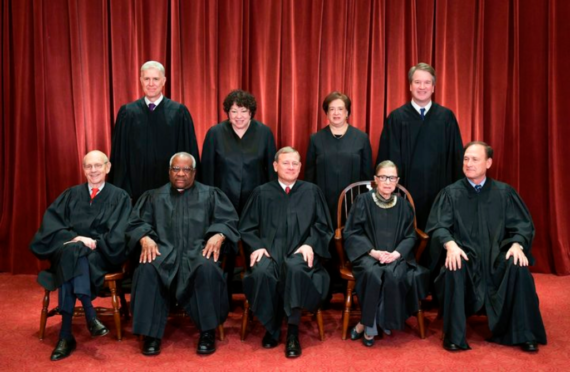SCOTUS Constrains Public Corruption Prosecutions Again

Friday SCOTUS announced Kelly v. US, unanimously reversing the conviction of a then-NJ governor Chris Christie aide for wire fraud for cooking up a political revenge scheme in return for a NJ city mayor denying a political endorsment. The scheme involved ordering traffic lanes closed headed from NJ to the GW Bridge in NYC, snarling traffic for 4 days and somehow presumably making the Mayor look bad (looks petty to me rather than politically effective retribution). The concocted story involved a fake traffic study as justification, with instructions and instrumentalities occurring over federally regulated wires, invoking the wire fraud statute.
Writing for a UNANIMOUS Court, which is more common than one might expect given the handwringing over the ideological tip of the Court, Justice Elena Kagan noted no “thing of value” had been acquired, and thus on a plain reading of the statute, no fraud had occurred. The upshot is a limit of use of wire fraud in political corruption cases where no property or money changes hands – a further narrowing of the federal government’s ability to go after political corruption, punting the issue to political processes, hopefully informed by diligent local and statewide media reporting.
This continues a trend of narrowing tools for the government. Recall just 4 years ago the reversed conviction of VA Governor Bob McDonnell on honest services fraud charges based on faulty jury instructions on “official act.”

A far greater concern is the ideological tip in the U.S. Courts of Appeal, where most appellate law is made, as President Trump has been filling up the appellate vacancies rapidly, benefiting from a compliant Senate and a change in cloture rules.






This issue is obviously lost in the tempest but is IMHO a really major problem in democracy as we currently practice it: There is no corruption. That thing you think is corrupt? That’s just governing, silly.
@JohnMcC: Yeah that’s kind of the takeaway from McDonnell.
Remember King Jugurtha’s warning about Rome, “A city for sale and doomed to quick destruction, if it should find a buyer.”
@JohnMcC: @Butch Bracknell: I’m not quite sure I agree.
IANAL but read Kelly narrowly: federal prosecutors tried to make a federal crime out of something that is not against federal law.
The McDonnell case was much more worrisome to me. But, still, the problem is that things like giving access, and even appointments to plum government jobs, to big money donors is part and parcel of the way we run our government. While it was obvious to me that McDonnell was taking bribes, much of what he did was tangential to everyday practices.
As I noted at the time,
@James Joyner: I don’t think we’re disagreeing on the larger point that the tools available to public corruption prosecutors are narrowing and more things are being pushed into the political realm for resolution. And with the dysfunction in our political system at present, I’m not sure that’s healthy long term. There’s still a reasonable middle that cares about these things, but the fringe nuts (on both skinny ends of the curve) who will justify anything in the name of advancing their agenda are more vocal than ever.
@Butch Bracknell: Agreed.
In the wake of Trump’s inevitable acquittal by the Republican-majority Senate after his impeachment by a Democratic-majority House, Steven Taylor correctly argued that impeachment has always been useless so long as a President has the support of his own partisans. And we’ve also seen that the 25th Amendment is essentially useless for a mentally incapacited President. So, really, we’re down to politics.
@James Joyner:
Clarified that for you, James.
There is something seriously wrong if the only probable (and now closed) avenue for going after a clear abuse of political office is a wire fraud statute.
The facts are not in dispute.
@DrDaveT: I read lots of things broadly. Pretty much every action of the Trump administration or the Senate Republican leadership, for example. And the Supreme Court’s broader set of rulings on the 4th Amendment, for a more related one.
But the ruling here and in the McDonnell cases were both unanimous and narrow. Justices appointed by Presidents of both parties—ranging from George HW Bush to Donald Trump—were all in agreement on both cases.
Do I think McDonnell and Christie committed corrupt acts? Absolutely. I think McDonnell, for whom I voted, should be in prison. But I think the court got the decisions right in terms of the law.
@drj: I’ll have to defer to Butch on this, as I just don’t know what other tools are available to the Feds on state-level corruption cases. One would think there would be state laws in play here but, again, that becomes problematic if the governor is in charge of the enforcement mechanisms. (I don’t know the state of play in New Jersey. Some states follow something close to a federal executive model and some are very much more independent. In Alabama, for example, the Governor, Lieutenant Governor, and Attorney General are all independently elected, creating an entirely different set of conflicts of interest.)
@James Joyner: /Well, sir, I actually framed the issue as a ‘problem of democracy as we practice it’. I get a reply that since narrowly interpreting the laws these activities can be interpreted as not illegal, what the hell!
If you have an answer to the damage done to democracy, that would be interesting.
@James Joyner: McDonnell is back down here in VB working for a law firm as a rainmaker. He amassed like $25M in legal bills, but I can’t imagine the firms are going to make him pay all that off. Even so, he will be paying that debt for the rest of his life. His life did NOT turn out the way he envisioned. Six years ago, he was a credible potential candidate for President. Now he’s a 60 year old divorced debtor with a wacko ex wife and a handful of complete loser kids who don’t appear to be able to drive to the grocery store unless they’re drunk.
@James Joyner:
Causality is pretty obvious here. With our current laws, money in the form of contributions is free (and too often anonymous) speech and therefore nigh impossible to reform. With our massive wealth inequity, a precious few people have access to speak to or influence our government. Big money donors use their access and influence to increase their wealth inequity, further tipping the balance of access and influence in their favor. This cycle perpetually reinforces itself.
If peddling influence is “tangential to every day practice,” then corruption is inevitable. How can it be otherwise?
@James Joyner: In today’s Open Forum I linked to a WAPO article on this subject. The author makes the point that this isn’t just the courts, everybody plays in this game. Legislatures, at all levels, make it easier on themselves by loosening the laws, and prosecutors avoid going after their own partisans, as do the courts. In this case there was a blatant, outrageous abuse of power. Which nobody cared about until it hit the news big time. And we’re dealing with that by killing off local news.
Don’t blame the prosecutors in the Bridgegate case. In the glare of publicity they had to do what they could with the poor tools available. How do we, the public, demand a Caesar’s wife standard for corruption? Contra the usual standard, it would be better that a few marginally corrupt, or even innocent, public officials lose their cockamamie jobs, or even go to jail, than that the whole system rot. This is another example, as though we needed more, of the adage that money is the root of all evil. Democracy cannot survive the flood of money we’ve allowed into our system.
@Butch Bracknell: Two observations. One, if he couldn’t do the time, he shouldn’t have done the crime. Note I’m using “crime” in the vernacular sense of something that’s against the law, which is apparently not how it’s evolved as a legal term of art. Two, I’m OK with McDonnell’s career being ruined, in fact it makes me happy. And hopefully the Bridgegate defendants are in a similar state. But in general it’s outrageous that being dragged into our legal system is, in itself, a severe punishment. This gets some attention in high profile cases like McDonnell and Flynn, but from what I read the real outrage is at the bottom, where almost everyone, even the innocent, pleads out because they can’t afford an effective defense.
@gVOR08: The maxim “the process is the punishment” is very old and it’s worse now than ever. Going to trial is ruinously expensive for almost anyone, which gives prosecutors enormous leverage in extracting a plea deal. Especially when combined with once-verboten practices like charge stacking and over-charging.
So, for example, while I think Michael Flynn is guilty and deserves to go to jail, the mere fact that “he pled guilty” isn’t dispositive. Lots of innocent people plead guilty to lesser charges to avoid the ruinous cost of fighting off higher ones.
@JohnMcC: I don’t see good answers, aside from electing better people to office. We rightly have a prohibition against ex post facto laws under our system, which precludes us from seeing corruption after the fact and punishing it based on “that’s obviously crooked.” We have to write laws ahead of time and, again rightly, they’re not allowed to be overly broad, since that makes them ripe for abuse. So, we have to hope corrupt politicians violate the letter of a pre-existing law written by other politicians who are leery of writing laws in such a way that they themselves might be ensnared by them.
@gVOR08: I don’t read @Butch Bracknell as lamenting McDonnell’s fall. He’s just arguing he didn’t get away Scot free—there were indeed consequences, even if they didn’t include punishment under the criminal justice system. (Aside from the cost of fighting that system, which, again is problematic.)
@James Joyner: “So, really, we’re down to politics.”
And with gerrymandering and voter suppression being ‘just politics’, we are entering an era where the key is locking in as many state governments as possible.
I see that the wonderful treasure who is Charlie Pierce has a column up at Esquire: I miss being a citizen of an actual representative democracy.
@James Joyner: Which leads to the question of ‘who watches the watchman’? It does not satisfy that we ‘have to hope that corrupt officials violate some clearly written law so egregiously that they fall into normal law enforcement’s hands. Frankly there should be some sort of Inspector General who maintains a position as a permanent paini n the ass of every governor and every cabinet official. And they should be very busy. Lots of prosecuting. Governors and cabinet officials (and presidents) should be very worried. Constantly.
And it should also be a pretty uncertain position being the Inspector General with frequent audits and such.
The court is really undervaluing spite.
Even Conan The Barbarian (1982) got this right:
ok, I’ll admit I’m late to the general piling-on, but I’m of an age, and grew up in a place, where I find more and more that I miss my politicians being corrupt… because when they sold out, they had the common decency to stay bought!